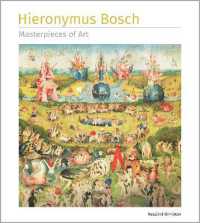- ホーム
- > 洋書
- > 英文書
- > Literary Criticism
Full Description
Investigates the connections between German writers H.G. Adler and W.G. Sebald and reveals a new hybrid paradigm of writing about the Holocaust in light of the wider literary-political implications of Holocaust representation since 1945.
Since 1945, authors and scholars have intensely debated what form literary fiction about the Holocaust should take. The works of H. G. Adler (1910-1988) and W. G. Sebald (1944-2001), two modernist scholar-poets who settled in England but never met, present new ways of reconceptualizing the nature of witnessing, literary testimony, and the possibility of a "poetics" after Auschwitz. Adler, a Czech Jew who survived Theresienstadt and Auschwitz, was a prolific writer of prose and poetry, but his work remained little known until Sebald, possibly the most celebrated German writer of recent years, cited it in his 2001 work, Austerlitz. Since then, a rediscovery of Adler has been under way. This volume of essays by international experts on Adler and Sebald investigates the connections between the two writers to reveal a new hybrid paradigm of writing about the Holocaust that advances our understanding of the relationship between literature, historiography, and autobiography. In doing so, the volume also reflects on the wider literary-political implications of Holocaust representation, demonstrating the shifting norms in German-language "Holocaust literature."
Contributors: Jeremy Adler, Jo Catling, Peter Filkins, Helen Finch, Frank Finlay, Kirstin Gwyer, Katrin Kohl, Michael Krüger, Martin Modlinger, Dora Osborne, Ruth Vogel-Klein, Lynn L. Wolff.
Helen Finch is Associate Professor in German at the University of Leeds. Lynn L. Wolff is assistant Professor at Michigan State University.
Contents
Introduction: The Adler-Sebald Intertextual Relationship as Paradigm for Intergenerational Literary Testimony
The Connections between H. G. Adler and W. G. Sebald, from a Personal Perspective
Memory's Witness-Witnessing Memory
Writing the Medusa: A Documentation of H. G. Adler and Theresienstadt in W. G. Sebald's Library
Poetics of Bearing Witness: H. G. Adler and W. G. Sebald
"Schmerzensspuren der Geschichte(n)": Memory and Intertextuality in H. G. Adler and W. G. Sebald
"Der Autor zwischen Literatur und Politik": H. G. Adler's "Engagement" and W. G. Sebald's "Restitution"
Memory, Witness, and the (Holocaust) Museum in H. G. Adler and W. G. Sebald
History, Emotions, Literature: The Representation of Theresienstadt in H. G. Adler's Theresienstadt 1941-1945, Antlitz einer Zwangsgemeinschaft and W. G. Sebald's Austerlitz
The Kafkaesque in H. G. Adler's and W. G. Sebald's Literary Historiographies
Generational Conflicts, Generational Affinities: Broch, Adorno, Adler, Sebald
"Der verwerfliche Literaturbetrieb unserer Epoche": H. G. Adler and the Postwar West German "Literary Field"
Afterword
Bibliography
Notes on the Contributors
Index



![なかよし 2018年9月号 [2018年8月3日発売]](../images/goods/ar2/web/eimgdata/EK-0571864.jpg)




